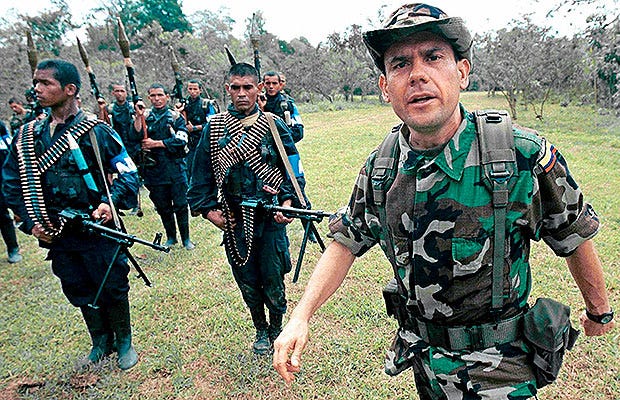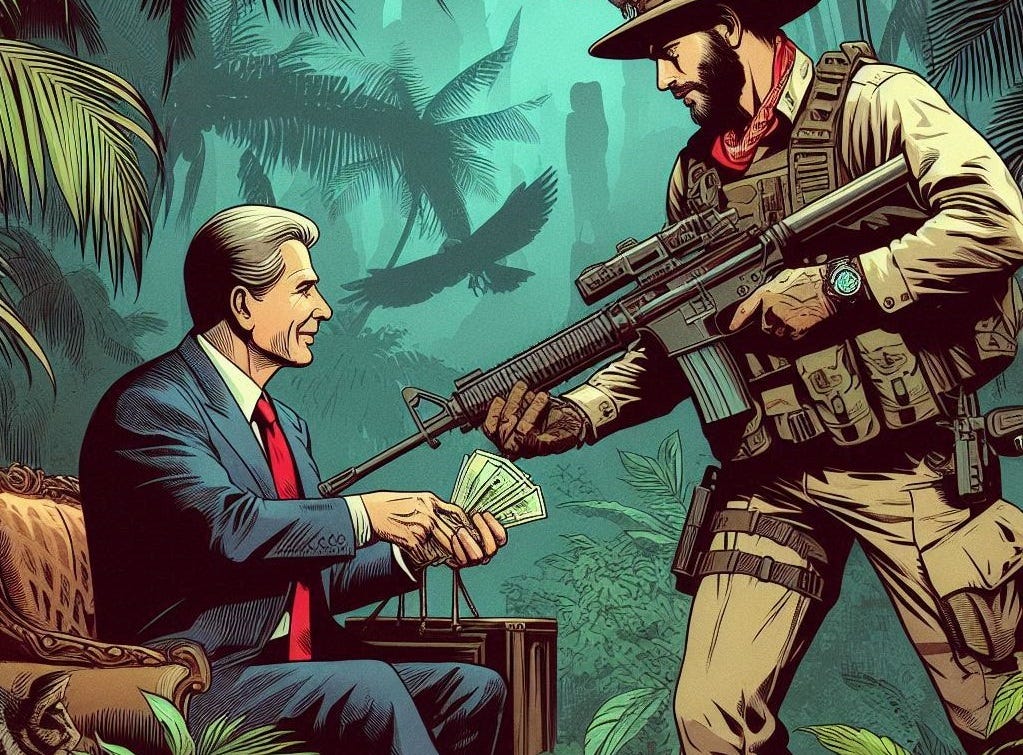Chiquita Brands found liable in U.S. courts for paying Colombian death squads
A civil suit brought by families in the U.S. brings dark new details to light in the decades-long court case
*This is an updated story of last week’s feature and has been updated with new information after a verdict was handed down in Miami on Monday, June 6*
In a landmark ruling in the fight for human rights, a U.S. jury in Miami has found banana giant Chiquita Brands International liable for financing the United Self-Defense Forces of Colombia (AUC), a brutal paramilitary death squad that was declared a terrorist organization by the U.S. during Colombia’s civil war.
After 17 years of legal proceedings, and a conviction in 2007 in U.S criminal courts, the first set of victims and their families have finally obtained justice.
Chiquita had previously been convicted and fined $25 million for making illegal payments to the AUC and trying to disguise them as business costs by the U.S. State Department, but victims of the AUC, who number in the thousands, never saw a cent of that.
Plaintiffs, represented by Earth Rights International, an NGO that describes itself as “advocating for corporate responsibility”, have advocated for nearly two decades in courts in both Colombia and the United States for the right to hold the fruit giant accountable in civil courts.
According to jury documents for the two “bellwether cases”, selected from over a hundred filed by victims that wrapped up Monday, jurists recommend a civil fine of $ 2 million to each family member filing suit.
“This historic ruling marks the first time that an American jury has held a major U.S. corporation liable for complicity in serious human rights abuses in another country, a milestone for justice,” said plaintiffs in a press release late Monday.
According to court findings, the company paid 3 cents on the dollar to AUC forces for each box of bananas exported from the country. In recent years Colombia’s “Peace Court” has heard testimony from AUC commanders which reinforced the findings of U.S. courts as well as unearthed new details in the schemes the company used to try and hide funding the paramilitary group.
The AUC is responsible for thousands of civilian deaths, eradicated entire villages, orchestrated the murders of trade union representatives and rivals, and kidnapped politicians during the Colombian civil war. The group was declared a terrorist organization by the U.S. State Department in 2001. Families of the victims of AUC have been lobbying for years for the right to sue the U.S. fruit company in civil courts— petitions that Chiquita Brands has delayed with legal tactics for over a decade.
Two “bellwether cases”, sample cases selected from among the hundreds of plaintiffs, wrapped up in Miami on June 10, with jurists ruling that Chiquita is liable for damages and suffering incurred by Colombian victims.
In addition to the payments Chiquita has already been convicted of, victims as well as ex-AUC commanders claim that the company delivered weapons and gasoline to the paramilitary forces in the region of Urabá, in Antioquia, Colombia. Victims argue that executives at the time were aware that these resources were being used to kill civilians and suppress unions in or near their operations in Colombia.
Chiquita has denied the accusations presented by the lawyers of the plaintiffs, arguing that the payments amounted to extortion and were made under duress. That same argument was rejected by U.S courts in the earlier decision against Chiquita, which ordered the company to pay a $25 million fine.
Chiquita Brands petitioned to move all civil cases to Colombian courts, but a judiciary panel in Colombia denied the motion and ordered the processes to be carried out in the U.S.
It is merely the latest turn in a long series of ongoing legal problems over Chiquita operations in Colombia. In August 2018, Colombia’s Prosecutor's Office formally accused executives at Chiquita of “aggravated conspiracy to commit a crime” as part of their funding criminal groups, as well as attempting to hide the funding in the company ledgers as “security payments”.
The case has dragged on for years, however, delayed multiple times via myriad legal tactics by Chiquita Brands lawyers. The Prosecutor’s Office has long faced accusations of protecting powerful economic actors in the country as well as several corruption convictions from within its ranks.

But Colombia has a new independent lead prosecutor: Luz Adriana Camargo Garzón. Her controversial confirmation confirmation process, initially blocked by right-wing members of the judicial body responsible for vetting candidates, was finally completed earlier this year. And she has expressed interest in returning to proceedings against Chiquita Brands in public comments.
The Colombian Peace Court has argued that Chiquitas crimes, which include violations outside of the AUC payments, and include repression of labor unions in the country, amount to “crimes against humanity”.
The plaintiffs in the U.S. civil court case were represented by Earth Rights International, an NGO that describes themselves as “activists, campaigners, and legal strategists who challenge powerful institutions that violate peoples’ rights and destroy our planet for profit.”
The central issue in the case is whether Chiquita “acted reasonably in dealing with the AUC and whether the payments made to AUC materially assisted the AUC in carrying out its illegal actions,” according to court documents.
Charles “Buck” Keiser, who was in charge of directing Chiquita's operations in Colombia from 1987 to 2000, testified before the court on May 3. According to his statements, in an attempt to avoid becoming mired in the conflict, the company did not directly purchase farms in the country, but rather organized contracts to buy fruit from other growers.
During this period, the company also made payments to left-wing guerilla forces who then controlled the region.
But Keiser claimed that the company was being extorted and had been violently attacked multiple times by illegal armed groups, attacks which resulted in millions of dollars in damages and the murder of several workers.
Lawyers for Earth Rights International presented testimony from ex-AUC commanders, that high-level executives from Chiquita met directly with AUC leaders, and organized payments through independent contractors in an attempt to hide the illegal activity.
The rise of paramilitaries, or “paracos” as they are often called in Colombia, can be traced back to the presidency of Alvaro Uribe, who created a series of public programs called “Convivirs”, which legalized private financing of security groups to act as defense forces against left-wing rebel groups during Colombia’s civil war.
In theory, money deriving from these programs was prohibited from reaching illegal armed groups, such as the AUC. But in practice, investigators rarely looked into the details of paramilitary financing and the AUC quickly grew to become the largest of hundreds of “self-defense forces” in the country.
These forces worked directly with the Colombian military during the civil war, providing support, intelligence, and even aiding in the infamous “false positives” cases, in which over 4,000 innocent civilians were executed and recorded in government statistics as guerilla fighters.
Uribe himself is in legal trouble in Colombia as well. A criminal case accusing him of witness tampering via bribery and threats in relation to investigations into his connections to “paraco” groups began in April.
But justice has been slow and imperfect. Will the case currently unfolding against Chiquita Brands in Florida result in further transparency? The families of the millions of victims of Colombia’s civil war are certainly betting on that being the case.
In the meantime, families of victims of the AUC, who have waited nearly two decades to hold the fruit giant responsible, finally got their day in court, and walked away with a victory in the long fight for accountability.
“This verdict sends a powerful message to corporations everywhere: profiting from human rights abuses will not go unpunished. These families, victimized by armed groups and corporations, asserted their power and prevailed in the judicial process,” said Marco Simons, EarthRights International General Counsel.
Pirate Wire Services is a reader-supported publication. To receive new posts and support our work, consider becoming a free or paid subscriber.






Thanks. Yes, some progress with this disturbing saga.